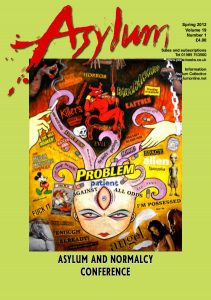Last September, along with our friends and supporters in the Critical Psychiatry and Hearing Voices Networks, the Asylum Collective held a conference at Manchester Metropolitan University to explore alternatives to the pathological labels of ‘mental illness’. This issue of the magazine includes some of the presentations from this event, as well as the usual sections of creative writing, poetry and reviews.

We also showcase more artwork by survivor activists: see the exciting new work by the Toronto-based artist and cartoonist Sarafn. Our conference was held alongside a Critical Disability Studies conference entitled ‘Theorising Normalcy and the Mundane’ (http:// cdsmmu.posterous.com/). ‘Normalcy’ is a term used by critical disability theorists and activists to question the way society and its institutions defne, categorise and understand what is normal.
The Normalcy conference aimed to explore how normality is culturally and socially produced, and to address issues such as society’s obsession with normality and rationality. So there are obvious connections with the concerns of Asylum. We hoped that both conferences would be a space to think together about the links and interconnections between disability and distress, and about whether critical disability studies could be useful to those of us who want to rethink and challenge psychiatric labels.
Holding the two conferences together enabled some crossing over between critical disability studies and critical mental health – both physically, by weaving in and out of each other’s conference sessions, and in our thinking. Over lunch, in the corridors, and in the pub afterwards, we were able to chat to people with different experiences of oppression and of different kinds of resistance. We hoped that it would be possible to explore links and possible areas for alliance between the disabled people’s movement, and the user/ survivor/critical mental health movement.
Perhaps the most interesting connection was made between mental health and the Neurodiversity movement – disability activists in the feld of autism, Asperger’s etc. Many people who are neuro-diverse often end up in the mental health system where their reactions to ‘neurotypical’ (i.e. non-autistic) society can make their difficulties worse, through misunderstandings, misdiagnosis and medication. These connections were strengthened when Asylum shared a stall with Disability Action Network (DAN) at the Manchester and Salford Anarchist bookfair, in December.
The two conferences also beamed some sessions over skype, with a number of people presenting from India. Despite being slightly fraught – what with power cuts in India and a bad internet connection in Manchester! – these sessions were a chance to make connections globally, and to hear about experiences and alternatives in countries other than the UK. In this issue of the magazine, Lavanya Seshasayee (from Bangalore, India) presents her experiences of recovery using a feminist standpoint, whilst Sabah, Kimberly and Anup (from Delhi) discuss different meanings of the word ‘asylum’, by means of an account of their observations at a temple healing-site in India.
Our conference coincided with the celebration of World Hearing Voices Day, and Dean Smith discussed his work exploring how the experience of hearing voices is understood in Kenya. China Mills reflected on the problem of Western bio-psychiatry being exported to other, often poorer countries, such as India. Continuing the international theme, Bob Sapey talked about how coercion might be challenged legally and professionally using the UN Convention on the Rights of Persons with Disabilities. The conference also saw the launch of the Campaign against Psychiatric Labels, which Sami Timimi presents for us in this issue.
Also in this issue, Will Parks talks about how he took his diagnosis into his own hands and made it something he felt comfortable with. Brenda Le Francois talks about how the practice of psychiatric diagnosis is continually performed and repeated as if the underlying ‘illness’ actually exists as a separate entity independent from the person’s social context: this reproduces an imaginary stark opposition between the ‘mentally well’ and the ‘mentally ill’. This is something also discussed in Nicky Forsyth’s article, Shades of Madness.
The fact that these events were held at a university (and supported by academics) may lend some credibility to the suggestion by Mick McKeown & Fiona Jones that, despite the dire state of higher education, universities might still be able to act as centres for radicalism. Despite the academic setting of our conference, we tried to make our presentations as accessible as possible. We may (or not) have achieved this – so please let us know!
We still want to hear about other things that are going on – in, around, against, or in defence of the mental health system. We might not always agree with what you have to say. But Asylum magazine exists as a space for controversial ideas, challenges and new ways of thinking. And holding the two conferences alongside each other last September was an attempt to create another such space.
Helen Spandler, China Mills and Dave Harper
Contents
- Special Issues: Asylum and normalcy conference
- Editorial: Helen Spandler, China Mills and Dave Harper
- No More Psychiatric Labels. Sami Timimi
- And We Are Still Being Psychiatrised. Brenda LeFrancois
- Challenging Psychiatric Coercion. Bob Sapey
- Resisting the Movement for Global Mental Health. China Mills
- The Temple and the Asylum. Sabah Siddiqui, Kimberly Lacroix and Anup Dhar
- A Feminist Self-Advocacy Approach on Recovery. Lavanya Seshashayee
- Voices Out of Africa. Dean Smith
- The Shades of Madness. Nicky Forsythe
- Can Universities be Radical Places? Mick McKeown and Fiona Jones
- News
- Letter: Anne Plumb
- Creative Suicidal Anxiety: Self Diagnosis of Chaos. William Park
- Poetry ‘The Lawn’s Café’; ‘Whittingham (Ward D)’ by William Park
- Creative Writing Section:
- Trains, Voices, Possible Narcoplexy Onset, I the Not Necessarily Divine, A New Theory Buds? Matilda Melbert
- Book Review: Demonic in the Age of Light by Whitney Robinson. Reviewed by Anne Plumb
- Cartoon: Sarafin
- Film Review. A Dangerous Method. Reviewed by Dave Harper
Asylum-19.1-2012-Asylum-and-Normalcy-Conf_compressed
